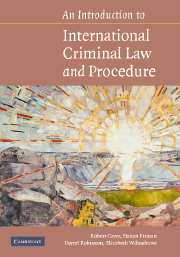Book contents
- Frontmatter
- Contents
- Preface
- Table of Cases
- Table of Treaties
- Table of Abbreviations
- Part A Introduction
- Part B Prosecutions in National Courts
- Part C International Prosecutions
- Part D Substantive Law of International Crimes
- 10 Genocide
- 11 Crimes Against Humanity
- 12 War Crimes
- 13 Aggression
- 14 Transnational Crimes, Terrorism and Torture
- Part E Principles and Procedures of International Prosecutions
- Part F Relationship Between National and International Systems
- Index
- References
12 - War Crimes
- Frontmatter
- Contents
- Preface
- Table of Cases
- Table of Treaties
- Table of Abbreviations
- Part A Introduction
- Part B Prosecutions in National Courts
- Part C International Prosecutions
- Part D Substantive Law of International Crimes
- 10 Genocide
- 11 Crimes Against Humanity
- 12 War Crimes
- 13 Aggression
- 14 Transnational Crimes, Terrorism and Torture
- Part E Principles and Procedures of International Prosecutions
- Part F Relationship Between National and International Systems
- Index
- References
Summary
Introduction
Overview
A war crime is a serious violation of the laws and customs applicable in armed conflict (also known as international humanitarian law), giving rise to individual criminal responsibility under international law. Because the law of war crimes is based on international humanitarian law, section 12.1 will explain the relevant underlying principles of international humanitarian law, and then the development of war crimes law. Section 12.2 will review issues common to all war crimes, namely the existence of armed conflict, the nexus between the conduct and the armed conflict, and the role of the perpetrator and victim. Section 12.3 will survey the specific offences constituting war crimes.
Unlike crimes against humanity, war crimes have no requirement of widespread or systematic commission. A single isolated act can constitute a war crime. For war crimes law, it is the situation of armed conflict that justifies international concern.
A brief history of humanitarian law
Laws and customs regulating warfare may be traced back to ancient times. While such norms have varied between civilizations and centuries, and were often shockingly lax by modern standards, it is significant that diverse cultures around the globe have recorded agreements, religious edicts, and military instructions laying out some rudimentary ground rules for military conflict. In recent centuries, military codes – such as the Lieber Code promulgated during the American Civil War – have refined and developed these customs.
Codification and progressive development at the international level was spurred in part by the efforts of one individual.
- Type
- Chapter
- Information
- An Introduction to International Criminal Law and Procedure , pp. 221 - 261Publisher: Cambridge University PressPrint publication year: 2007



